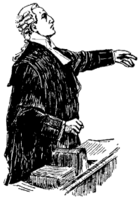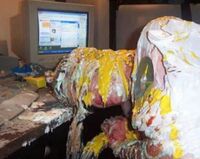Barristers
Barristers[edit]
Who they are[edit]
Barristers are a professional body of speech makers in England (Wales being, for this purpose, a province of England) who work in courts of law. They help other people argue with one another and are generally feared for their extreme intelligence, power and social status. They ask questions but do not answer them.
Dress Codes and other fashions[edit]
When at work, they wear long black robes, after the popularity of George Lucas's creation the Darth Vader, and wigs after the popularity of the late and great European aristocracy following the Black Death. When not at work in court they lounge in their chambers, which are their bedrooms. Barristers' chambers are usually shared; with several barristers to one bed. However, they do not get along with each other or anyone else because they have spent too much time learning how to argue and not enough time learning to be friends. This unfriendly culture was not changed by the admission of women to the profession. A barristers' chambers is usually an old fashioned kind of place, with lots of dusty books, special bedding and dungeons where they keep pupils. Pupils wish to be barristers but are more akin to victims of crime when in chambers. Pupils are regularly whipped when not in the dungeons.
Clubs[edit]
All barristers have to be members of special health and fitness clubs, called Inns of Court, of which there are four: Greyed Inn, Piddle Temple, Sinner Temple and Lincoln's Inn. There they dine together at long wooden tables and drink plenty of port. Greyed Inn was exempt on tax on alcohol forever by decreee of Queen Elizabeth 1st. Lincoln's Inn is famed for its Christian charity because instead of being a massive drinking club it houses all of London's homeless who are allowed to drink soup there so long as they don't walk on the grass. Sinner and Piddle do not allow anyone to walk their grass, soup or not; whereas Greyed Inn opens its grass up to the public for one hour a day.
Legalese[edit]
Barristers speak a language all of their own, called Legalese which is designed to stop other people from understanding what they are saying. Legalese is a mixture of Church Latin, Medieval Latin, Latin Latin, Old English, Middle English, Norman French and pomposity. The Labour government elected in 1997 banned the Latin part of Legalese but parts of it persist. Unfortunately, in its zeal to rid the legal profession of antiquated Latin terms, the Labour Government also abolished Magna Carta and habeas Corpus.
Parties[edit]
Barristers often get called to the best and the worst parties, with the consequence that their lifestyle involves meeting all sorts of people and doing all sorts of things. It is said that no sexual depravity is too low for them to sink into and neither will they refuse any request. If a party needs to be confidential they will host it in their chambers although most party goers cannot afford their fees.
QCs[edit]
The mark of a top level barrister is a little acronym after their name: QC. This means 'Queer Council' These are some of the higher paid barristers who are most queer.
Famous barristers[edit]
The most famous barristers in England today include half of the Queen's cabinet and half of her shadow cabinet. The most famous barrister in history is Marshall Hall, an ex-law enforcer from America who couldn't get along with anyone stateside and consequently moved to England where he discovered that poor social skills and a proclivity for causing trouble went down very well indeed.
Most popular barrister of today[edit]
The most popular barrister in the country is Cherie Booth QC who famously failed to stop her prime minister from leading the country into an illegal war, which was exactly the kind of behaviour the English feel most proud of.
Facial Hair[edit]
Barristers wear wigs because they have all been driven bald, even the female ones, by the stress of constantly arguing. They sometimes sport large ungainly moustaches but beards are banned and only a handful flout these sacred rules.

